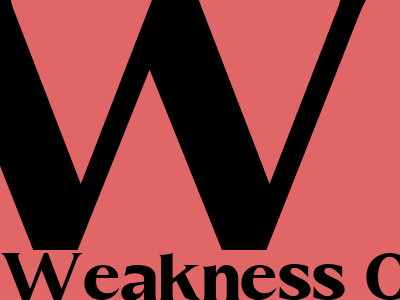Chronic Weaknesses and Their Impact on Daily Life
Understanding Chronic Weaknesses
Chronic weaknesses refer to persistent physical or mental limitations that affect an individual's ability to perform daily activities. These weaknesses can be caused by various factors, including genetic predispositions, injuries, illnesses, or developmental disorders. Chronic weaknesses may manifest in different ways, from reduced muscle strength and endurance to cognitive impairments and emotional challenges.
Types of Chronic Weaknesses
Chronic weaknesses can vary in severity and type. Some common examples include:
- Muscular Weakness: Reduced muscle strength and endurance, affecting mobility and physical tasks.
- Cognitive Impairments: Difficulties with memory, attention, problem-solving, or language.
- Sensory Impairments: Vision or hearing loss, impacting perception and communication.
- Emotional Challenges: Persistent anxiety, depression, or mood swings.
- Chronic Fatigue: Persistent exhaustion and low energy levels, affecting daily activities and well-being.
Impact on Daily Life
Chronic weaknesses can significantly affect an individual's daily life. They may experience limitations in:
- Physical Activities: Difficulty with walking, lifting objects, or performing strenuous tasks.
- Cognitive Function: Challenges with learning, problem-solving, or remembering information.
- Social Interactions: Obstacles in communicating, forming relationships, or engaging in social activities.
- Emotional Well-being: Persistent psychological distress, impacting self-esteem and relationships.
- Educational or Employment Opportunities: Limitations in academic or professional pursuits due to cognitive or physical challenges.
Addressing Chronic Weaknesses
Addressing chronic weaknesses often involves a multifaceted approach. Depending on the type and severity of the weakness, individuals may benefit from:
- Medical Interventions: Medications, physical therapy, or assistive devices to manage symptoms or improve function.
- Cognitive Rehabilitation: Therapy to enhance cognitive skills, memory, and problem-solving abilities.
- Lifestyle Modifications: Adjustments to diet, exercise, or sleep habits to support overall health and well-being.
- Support Systems: Emotional support from family, friends, or support groups.
- Educational and Employment Accommodations: Adjustments to learning or work environments to accommodate specific needs.
Living with Chronic Weaknesses
Living with chronic weaknesses can be challenging, but individuals can adopt strategies to enhance their quality of life.
- Self-Advocacy: Communicating needs and seeking support from healthcare professionals and others.
- Acceptance: Understanding and accepting the limitations while focusing on strengths and abilities.
- Empowerment: Taking control of one's life and seeking opportunities for growth and fulfillment.
- Resilience: Developing coping mechanisms and finding ways to overcome challenges.
- Purpose and Meaning: Identifying meaningful activities and goals that bring joy and fulfillment.
Chronic weaknesses may present obstacles, but they do not define an individual's worth or potential. With proper support, understanding, and a positive mindset, individuals can live fulfilling and meaningful lives despite their challenges.

Komentar